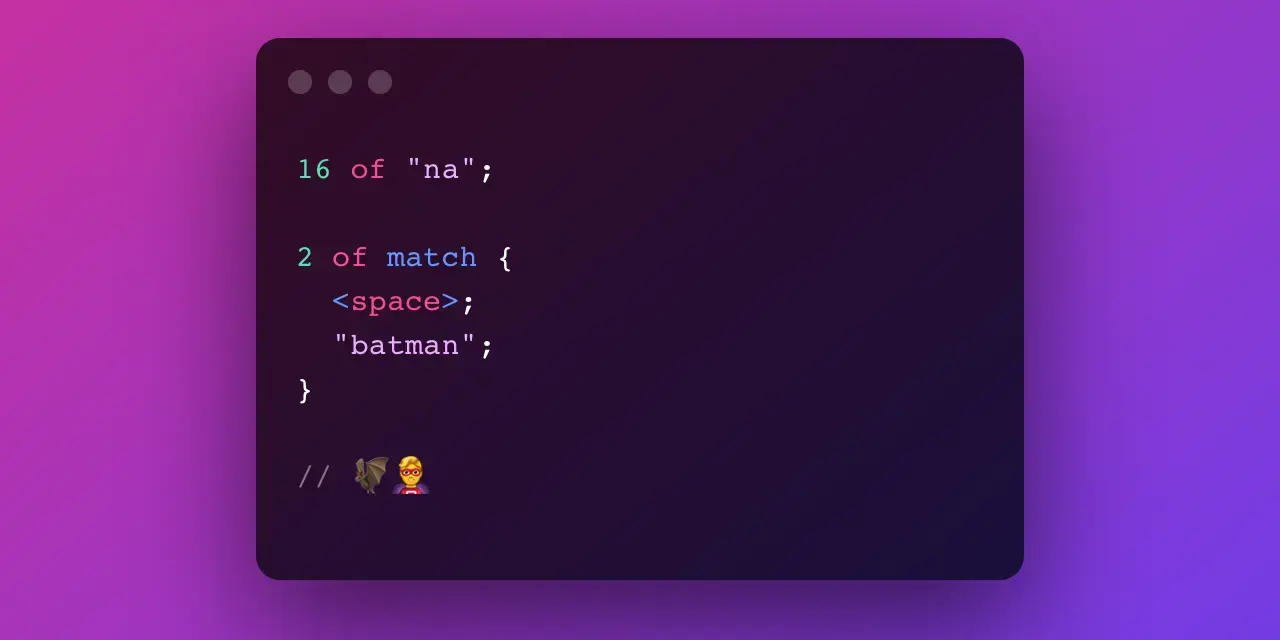- cross-posted to:
- rust@programming.dev
- rust@lemmy.ml

Who is this for? People who write lots of regular expressions won’t need it because they know what they’re doing and people who don’t write lots of regular expressions probably won’t find it anyway.
It just seems like a weird type of user who actually wants this.

I almost never use regex, but when I do, I’d love something like this. Exactly because I don’t use regex enough to be bothered learning it’s impenetrable syntax.

I learned enough to see how powerful it was, then started using it within Sublime Text to edit data from time to time. (Extract URLs or something from a websites code, reformat X or Y data for a script I’m hacking together) and I’ve slowly retained more and more of the elements I repeatedly use. I think I’ve actually got a pretty good grasp on it. Maybe you should be using it more.

I’m not a programmer by trade so I only program when I need something and regex is a small subset of that. Usually I find something someone else wrote and adapt it to my needs. But it would be nice to be able to write things from scratch, this would be a helpful tool for that for sure.

When you want to get better using a hammer, just treat everything as a nail.

i mean, you can learn the basics of matching in 30 minutes or less. that core knowledge will be broadly applicable across any tool that uses regex. things get much easier once to have a handle on the basics.
…or you can learn this regex dsl and still have to learn regex. the difference is you’re learning a non-portable regex syntax.

Sure. I just very rarely need just basic regexes.
And once you go beyond these the syntax gets very obtuse. Which means I’m spending an hour+ googling something close to what I need and then using a sandbox to try and tweak it until it does what I need. Then I paste something into my code that I won’t understand anymore 5 minutes into the future - which isn’t exactly great for maintainability.

This is a good point too. Just because you don’t use regex often doesn’t mean your needs are simple. They are probably much the same as someone who uses it often. Which is why readability and less learning curve is a good thing.

fair!

Probably I’ve spent the 30 minutes 5-10 times over my life. But then it’s a few years till I need it again and I need to spend the 30 minutes again.

I think it’s for me. I occasionally need regular expressions, like any career programmer. I also hate regular expressions. I have to complely relearn the every time I use them.

I’m not a programmer, but I do have to write scripts, and I’m the same way with regex.

me for example. I don’t write regex often enough to be really familar with the cryptic syntax. But I do use them every once in a while and dread the occasion every time. Having a more expressive way to write pattern matching instructions would be really useful to me.

But then you’ll have to learn the syntax of this instead.
I suspect that if you actually start using Melody you won’t find it as helpful as you think you might. Maybe I’m wrong. Let’s see in a year’s time.

I mean it’s JS. I’m not touching that if I can help it. But what you describe is less of a problem with the concept and more one with an immature technology.

the way I see it, you seem to need to learn and understand all the same concepts as when using regex in order to write a functional pattern in this. It does not seem to really offer any abstractions really. It’s just regex with a really really verbose syntax. Once you learn the concepts (which you have to anyway) then learning a new syntax should be easy with a simple cheatsheet. The syntax for this actually looks more complicated to me.

It might be used in education. Some who learned it this way might stick to it, or advance to your first group.

Oh great. A new flavour of regex, but it’s less portable and more verbose. https://xkcd.com/927/
I wouldn’t consider Melody a new flavour of regex as it compiles to ECMAScript regular expressions.
I’d consider being more verbose than regular expressions as a great thing for what this project aims to do, regular expressions are very write optimized which is the wrong (IMO) tradeoff to make in a shared codebase (or even your personal code that’s more than a few days old) where code is read much more often.

respectfully disagree—this is very much a regex dsl. folks still need to conceptually understand regex to use this, which begs the question about who this is for.
the best use case i can think of is large and complicated expressions, but i’d need to see more of that to have a definitive opinion.

I don’t know all the forms of regex but might it be useful to have this capable of compiling to different types of regex?

if it can only be used to create regexes, and all programs compile to regexes, then it is a regex flavor in itself.
And let’s not kid ourselves, regexes are not that hard. They can look cryptic, but in most cases they’re not really that hard to understand.
all this does is make it much more verbose and introduce the HUGE inconvenience of a separate compiler for regexes, since regexes are typically embedded within other files written in other languages that this compiler can’t understand. So somehow regexes would end up needing their own file.

but it’s less portable and more verbose
you misspelled “less obtuse and more expressive”
Also it doesn’t compete with regex. It’s an abstraction layer. You know, the thing programmers have been building since the dawn of programming to make everyone’s lives easier. There’s a reason why everyone who has the option to has stopped working directly with assembly and C.

I am very much in the market for a way to do regex without resorting to incantations that look like someone spilled a bag of special characters. Just not on JS…
You seem to be the author. A suggestion to you. You should really rethink your playground. All it currently does is turning melody into regex, which is important to have for comparison. But you’re specifically courting people who DON’T want to deal with regex syntax. What you desperately need is a way to run melody expressions. And - if possible - a way to translate regex into melody wouldn’t hurt as well.
Many (most?) of us tend to google regex on the web and pasting them in our code. Having them converted into a syntax that we can better understand would be hugely helpful.

oh god no, that’s an even bigger abomination than regex themselves

But I learned Perl in the 00’s and I don’t want those neurons to go to waste!

eh, If your goal is to make regular expression simpler, a web application where users can click to generate things would prob be easier.

so, where’s the email address regex? that’s where this lives or dies. there is no reason to use this for extremely simple happy-path regexes.
i’m having a tough time understanding who this is for. a beginner might think this is great, but they’re shooting themselves in the foot by adding an additional layer of abstraction rather than reading something to learn the basics.

I am of the opinion that regex for email address is a bad idea. The only two things that you need to check an email address are:
Does the address contain an @ symbol?
Is there a dot to the right of the @ symbol?Then just try to deliver to it, and let the MTA do the rest.
Email addresses can be complicated, and there’s plenty of valid addresses that can be excluded by attempts at regex validation.

i said “email” but what i meant was “show me a complicated example”. i don’t disagree with anything you said.

I agree. In fact, the only check is if it contains the @ symbol, since “com” and other TLDs/gTLDs can have MX records, it is possible to have
email@com. Not that we’d ever see it in practice though.
@Zikeji It’s possible for TLDs to have A records, and for a while there were a few that did. But ICANN forbids top level A records, and I wouldn’t be surprised if they forbid top level MX records as well.
Anyway, you would literally enter the address as “email@com.” including the trailing dot, which represents the DNS root that contains all the TLDs. You can also think of the trailing dot as an indicator of a FQDN (instead of a hostname within your local search domain).

If it can do that, i might just use it. It’ll make code a whole lot cleaner to read.

I disagree. Anyone familiar with regex can debug these statements post conversion. Anyone not familiar with regex is going to have to learn something in order to debug the statement. I’d rather learn something that’s expressive and easy to visually parse.
regex syntax is a vestige of the old “as few bytes as possible” era where every character of code had to be written personally. It’s an obsolete way of thinking for the vast majority of programming.

I can’t say this is for me. What I really need is something that will convert one flavor of regex to another. It’s really annoying to always have to look up the shortcuts and capture group syntax.

Yes! I actually had this exact desire years ago, and went searching for it. RegexBuddy does this, best $US 40 I’ve spent. It’ll even do its best to make something that’ll match the same things, even if you’re using features that aren’t technically supported in the target. Don’t worry, it’ll describe exactly what doesn’t work, and why, when it does that.
For example, if I ask it to convert from C#
/(?>atomic) case-(?i)insensitive(?-i) string/to JavaScript (chrome) it’ll throw out:/(?:atomic) case-[iI][nN][sS][eE][nN][sS][iI][tT][iI][vV][eE] string/, along with the warning:Conversion is incorrect because the target application's regular expression flavor doesn't have certain features: JavaScript (Chrome) does not support atomic grouping

Just use parser combinators

Oh nice. An entire language that is write-only.

this is really the problem here. it’s very much lipstick-on-a-pig and doesn’t actually reduce complexity.

Quickly looking at the readme, it seems nice and readable. I’d be curious though to see examples of monster expressions, as I’d be worried that Melody’s syntax wouldn’t be so helpful there (not sure though).
I don’t mind the verbosity, but it does feel like it leans a tad too much plain language with the
some of …stuff.It’d be cool if it could also produce train track diagrams.

I prefer the pomsky syntax. https://pomsky-lang.org/

Hmm, I think I will give it a star in case I need something like this. I did use regex enough to know how it works though I do have a offline regex101 software to aid into that.


I used to hate regex, but after having had to use it a bunch and slowly getting used to the syntax, I can sort of read it quickly, and fully parse it if I stare at a regex expression long enough. It seems like having a DSL like regex is important because it does something well with a much shorter section of code than the equivalent host language code that does the same thing. But, it probably takes as long to understand a section of regex code as it does to understand the equivalent host language code, so it feels like you’re staring at a small block of impenetrable code, where you would otherwise be scanning a larger block of code. If that makes sense
Props to the authors of this language

